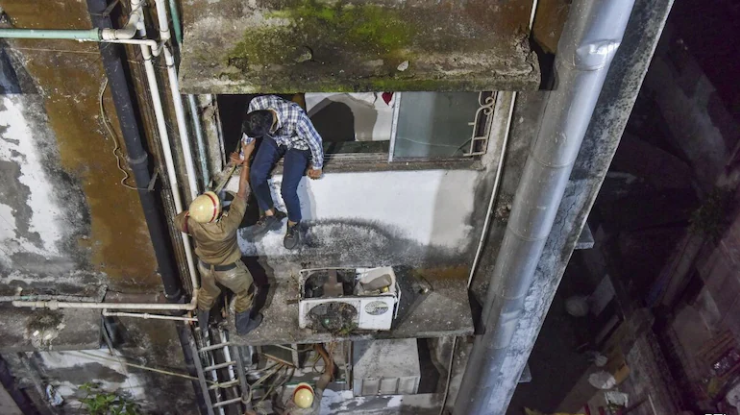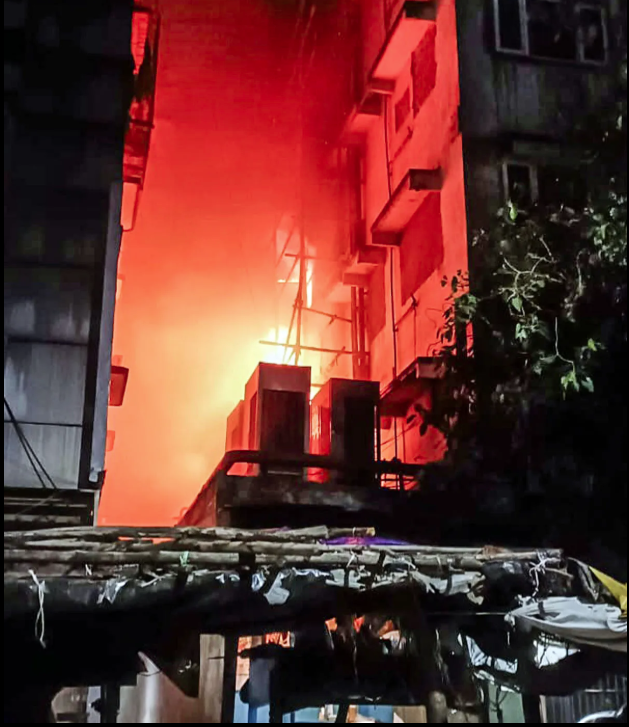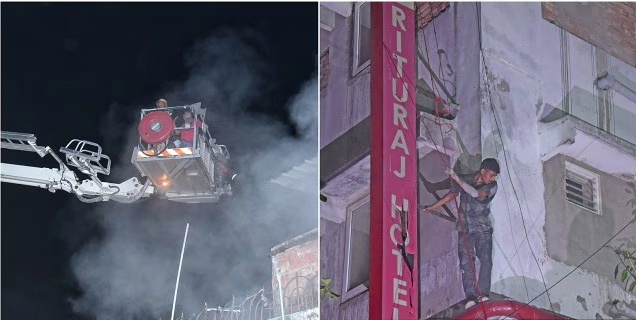📅 Date & Location
- Date: 29 April 2025 (evening)
- Location: Rituraj Hotel, Burrabazar / Mechhua area, Central North Kolkata, West Bengal, India
🕯 What Happened?
- Around 8:15 PM, a fire broke out in a room near the kitchen on the first floor.
- The blaze quickly spread upward through the six-storey building.
- At the time, ≈ 50 people were inside (hotel had 45 rooms, most occupied).
- Rescue operations included use of hydraulic ladders, rooftop rescues, and evacuation from balconies and windows.
- Tragically, 14 people died (including two children) and many others were injured.
- Many victims were found in staircases, suggesting smoke inhalation / suffocation was a major cause.
- In panic, one or more people also jumped off the building — one man is reported to have died in this way.
🔍 Mistakes / What Went Wrong
- Origin in kitchen-adjacent room – high risk zone for fire, possibly electrical/gas/cooking source.
- Rapid vertical spread – poor compartmentalization, lack of fire doors/barriers.
- Smoke propagation through staircases/corridors, trapping victims.
- Inadequate escape routes or absence of smoke-protected exits.
- Insufficient fire detection & suppression systems — alarms, sprinklers, or smoke control likely nonfunctional.
- Overcrowding / full occupancy increased risk.
- Delayed rescue for some due to congested approach roads.
- Panic responses (jumping) reflect lack of training / guidance.
⚖ Hidden / Less-mentioned Truths
- The fire began on the first floor (kitchen zone) but spread to upper floors faster than containment efforts.
- Many victims did not die from burns, but from asphyxiation/smoke inhalation while trying to escape.
- Some rooms lacked direct access to safe exits/windows, making evacuation difficult.
- Hotel owner and manager were arrested after the fire, pointing to negligence.
- A family from Tamil Nadu lost two children in the tragedy, showing how everyday travelers are equally vulnerable.
🧯 How Could It Have Been Prevented?
- Strict fire zoning: Kitchen and utility areas must be isolated with fire-resistant walls and doors.
- Smoke detectors + automatic sprinklers on all floors.
- Pressurised stairwells / smoke control so staircases remain usable.
- Multiple emergency exits, clearly marked and free from obstruction.
- Fire drills / staff training for evacuation protocols.
- Regular fire safety audits and enforcement.
- Use of fire-resistant materials in interiors.
- Back-up power for alarms and detection systems.
🛡 Survival Guide (If You Ever Face Such a Fire)
- Stay calm, don’t rush blindly.
- Stay low & cover nose/mouth with cloth if smoke is thick.
- Avoid stairwells if full of smoke — seek alternate routes or safe balcony/window.
- Signal for help with phone light, cloth, or shouting.
- Do not jump from high floors unless last resort.
- If trapped, seal doors with wet cloth and wait for rescue.
- Call 101/112 immediately with building, floor, and number of people.
- Prioritize children, elderly, and injured in escape.
- Exit via safe routes only.
- Seek medical help for smoke inhalation even if no burns.
📊 Data / Stats Box
- Deaths: 14 (including 2 children)
- People inside: ~50 guests/occupants
- Floors: 6 storeys
- Fire engines deployed: 6
- Cause: Believed to originate near kitchen/electrical zone, investigation ongoing
📽 Visuals (Suggestions / collected)



🙏 Voices / Human Angle
- A Tamil Nadu family lost their 8-year-old daughter and 3-year-old son in the fire.
- Survivors described crawling to ledges, waiting for rescue through windows.
- One person said they “managed to wriggle onto a ledge” when stairwells filled with smoke.
📢 Systemic Lessons
- High-risk buildings must strictly follow fire safety codes.
- Unannounced audits by fire departments are essential.
- Strict penalty & accountability for owners/management flouting norms.
- Better urban planning for access in congested areas like Burrabazar.
- Guest awareness campaigns: always check exits and safety in hotels.
- Adopt technology: smart smoke sensors, IoT-based alarms, real-time monitoring.
💡 What You Can Do Today
✅ When staying in hotels, check escape plan & exits on arrival.
✅ Ask about sprinklers, alarms, and emergency systems.
✅ Avoid staying in visibly unsafe / congested old buildings.
✅ Report fire safety violations.
✅ Share this case study to spread awareness.
✅ Volunteer with VFF India / HowToSurvive to spread survival knowledge.
🔚 Closing Line
“In cramped corners of cities, one spark can turn a hotel into a death trap — but awareness, systems, and courage can turn tragedy into survival.”

